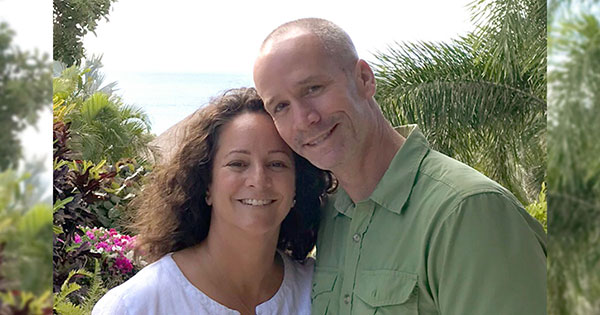Editor’s note: October is Breast Cancer Awareness Month. Premera is taking this time to talk about early detection and cancer prevention. If you or someone you know is experiencing a cancer diagnosis, Premera services can be found here.
I’m fine.
Like most men, this statement helps us make the decision to avoid seeing our doctors regularly and dealing with our fears. For me, if I felt fine and didn’t see anything wrong, why should I go?
I hadn’t seen my doctor in five years, mostly because I felt that there were more important things to do at that point in my life.
Turns out, I wasn’t fine. This was 1997.
During the routine exam, my doctor paused and looked at me. He said, “This is abnormal.”
My heart sank, and I froze. “It’s cancer,” I thought to myself. Accompanied with racing thoughts of denial, the ultrasound confirmed it.
I had stage 1 testicular cancer.
For the rest of that visit, I was mentally checked out. I couldn’t believe this was happening to me. I kept saying, “Oh my God, I have cancer.”
It really made me question my mortality. To reassure me, my doctor said if I follow the treatment properly, there is a 95 percent chance of survival.
Shortly after the diagnosis, I went in for surgery to remove the tumor.

Things looked good, until they weren’t
After my treatment, I was on surveillance, where they tested me every quarter to make sure there were no cancer cells in my body. I know it might seem routine, but it was difficult. I found that as I got closer to the day, my mind played tricks and often made my body feel like there was something wrong.
While I was on surveillance, I always told myself that if the cancer had returned, I’d be fine. I’d do chemo.
As the holidays approached in 2001, four years after my treatment, the mind games saved my life. My doctor found abnormal lymph nodes in my abdomen. This is typically the second stop on the journey of testicular cancer cells.
I was crushed. I was one year away from being officially “cured” of my cancer.
After some uncertainty, I went for a second opinion. I sought out Lance Armstrong’s doctor: Dr. Craig Nichols. At the time, he was in Oregon. He shared with me that if this was a recurrence of the original cancer cells, chemotherapy would not fix it.
Well, there went my backup plan!
As my head swirled, I was only able to utter two words as I looked him in the eye, “No shit?”
After glancing at the floor, our eyes met again and he said only one word, “Yes.”
Confused. Shocked. Disoriented. Those were the many things I was feeling at the time. I remember asking, “What can I do?”
Nichols recommended I find the best surgeon to remove the lymph nodes. He said there was one place and one surgeon for such an important surgery. Dr. Richard Foster at Indiana University, the birthplace of testicular cancer treatment. Nichols asked if I wanted him to call Foster, I said yes. He left the room, and five minutes later Nichols returned. “You are in.” Less than a month later, I had the surgery in Indianapolis.
I now have an incision scar that starts from my belly button up to my breast plate. They removed 33 nodes. Only one had cancer and it was not a recurrence. I was lucky. As I recovered from the surgery, I had a follow up visit with Dr. Nichols, right before Thanksgiving. He said I would need to go through two rounds of chemo to kill off any remaining cancer cells.
Two months post-surgery a new journey was about to begin. I sought chemo treatment at Seattle Cancer Care Alliance (SCCA) located in the Lake Union neighborhood of Seattle. I thought I was mentally prepared for what came next. I wasn’t.
I remember waking up one morning and finding most of my hair on my pillow. Then progressively, I started losing weight. In total, I lost somewhere between 20 to 25 pounds. During treatment, I often experienced severe fevers at night.
I asked, “Why me?” I never thought I would, but I did.
My lifestyle changed
I couldn’t go out except for the follow-up doctor’s appointments. I looked forward to those appointments because it allowed me to get out and interact with people. I spent my days alone at my house shuffling around, or in my favorite place, laying on the couch, staring out the window. Oddly, I was at peace, encouraged that I could conquer cancer and proud of the fact that I was fighting as best I could.
Like I said, it was the holidays. To this day, I remember my “Chemo Christmas” whenever someone says happy holidays. My community was supportive. One of my relatives brought our family a Christmas tree. The act of decorating that tree was exhausting. I would literally lay on the couch to rest, then get up and put an ornament up, and then rest again on the couch. You can imagine how long it took me to decorate that tree.
My last chemo appointment was Jan. 2, 2002.
Get checked
I know that cancer affects all of us. My wife, a cancer survivor herself, and I support the local The American Cancer Society (ACS) to help raise awareness for early detection and prevention. According to The American Cancer Society, there are about 9,310 new diagnoses of testicular cancer and about 400 deaths from the disease.
There is a lack of awareness for cancers that affect men often because of the stigma surrounding men and cancer. This month, my wife and I shared our story for ACS’ Crucial Catch Campaign in partnership with the NFL.
I urge you to talk to a loved one and ask when they had their last physical exam.
Michael Hjort is the vice president of Lean at Premera Blue Cross.



